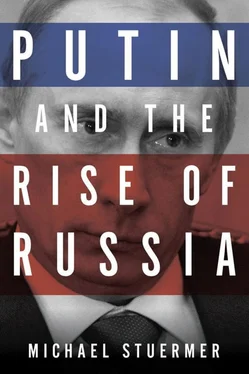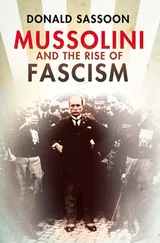In the post-1989 world the greatest of all challenges for the former antagonists was to create together an equitable and fair system, in which Russia would be part of a new world order – as promised by the elder Bush in the aftermath of the 1990-91 Gulf War. This opportunity was missed during the decade when the West was strong and Russia was weak. Do we have today the Russia we deserve? To be torn between a resurgent Russia and a declining Pax Americana would be divisive, indeed fatal, for today’s Europe and an enormous burden on the Atlantic alliance.
It is late, but perhaps not too late, to think big and try once more. After all, the rise and rise of China in the Far East – which is not so far away when seen from Siberia, where much of Europe’s oil and gas comes from – poses vast challenges. So does the threat of radical Islam in the Middle East, be it the Iranians’ nuclear ambitions, be it terrorist disruption. For good measure one can add accelerating climate change and the spread – and eventual containment – of weapons of mass destruction, of terrorism and failed states, of cyberwar and organized crime. All those spectres haunting the world are of equal concern both to Russia and to Western nations.
History is on the move again. But it is not an inexorable fate that we face but an open and challenging future. In all of this, Russia, for better and for worse, will have a key role to play.
‘The Tsar of Russia is the military chief, and each of his days is a day of battle.’
Marquis de Custine,
Journey for Our Time
The date was 10 February 2007, in the middle of Munich’s popular carnival season. The venue was the Bayerischer Hof, a five-star hotel where traditionally the annual Wehrkunde Conference of Cold War times and now the post-Cold War ‘Munich Security Conference’ meets for a high-level, two-day event. This get-together of the strategic community was initiated by Ewald von Kleist, a man from the history books who supported Count Stauffenberg in the July 1944 attempt to blow up the German dictator. His successor in the chair was Horst Teltschik, for many years Chancellor Kohl’s most trusted foreign policy adviser. In 2007 he had invited the Russian leader to give a key-note speech. Little did those wearing insiders’ badges or, for that matter, the scores of journalists following the proceedings from adjacent rooms, know that they were in for a defining moment in Russia’s relations with America and the West. Indeed, after that Munich meeting some red lines, hitherto blurred by arrogance, ignorance and wishful thinking, were clearly discernible – lines which the master of the Kremlin wanted to be respected, in Eastern Europe, in the Balkans and throughout Central Asia.
On that first morning of the conference, German chancellor Angela Merkel was holding forth. Meanwhile, those who sat near him could observe how Russian president Vladimir Putin was busy making changes to the manuscript that his staff had given him, striking out entire paragraphs and putting in new ones, scribbling notes in the margins, from time to time shaking his head as if in anger, and paying little or no attention to what the German Number One had to tell the world leaders, defence experts and political analysts assembled in the air-conditioned, brightly lit ballroom. It was clear beyond the slightest doubt that Putin, sitting in the front row, did not have to ask any one for approval of the speech he was to deliver, let alone for permission to outline the future course of Russia’s relations with the West in general and the United States in particular. Putin was clearly in control – not only of the next thirty or so minutes but of Russia’s foreign and security affairs.
When Putin mounted the rostrum, he showed no emotion except cold resolve. He spoke in a low-key voice, with sparse body language, his emotions carefully disciplined and controlled. Of course he spoke in Russian. The conference’s tradition, he warned his listeners with a whiff of sarcasm, ‘allows me to avoid excessive politeness’.
What he had to say to the 200 or so experts assembled, live into the world’s TV cameras, did indeed not amount to a lesson in diplomatic finesse. He made no secret of the fact that he felt, like all of Russia, that the West had unilaterally and unfairly exploited the period of troubles that the heirs to the Soviet Union had recently experienced. That instead of offering compensation for Russian losses the West had done everything in its power to secure geopolitical advantage throughout Eastern Europe and most of Central Asia. That the relationship with NATO was tenuous at best. That the Russians felt encircled from their front garden on the Baltic to their backyard in Uzbekistan. That he resented NATO’s recent ‘expansion’ to Eastern Europe – referring to Poland, the Czech Republic, Hungary and Slovakia, formerly Soviet satellites in the Warsaw Pact, and also to the Baltic states that were formerly part of the Soviet Union. That the US had not honoured the cheque of goodwill expressed in the agreements on Germany winding up the Cold War or the military support offered – and obtained – after 9/11. That the West had no idea what was at stake in Chechnya – though Putin did not name the troubled province. The bottom line: the bear had left his den, and things would have to change.
While the Europeans were seen as minor offenders, and the former satellite countries of the Soviet Empire a mere irritant, the United States came in for a targeted attack, the aspiring great power pitted against the declining global power. There was disappointment in his tone and manner about being excluded from Europe. Putin felt let down by the West, accusing Western nations of ‘ideological stereotypes, double standards and other typical aspects of Cold War thinking’. But his wrath was reserved for the United States. Was he merely irritated at being constantly lectured by George W. Bush et al on democracy and Russia’s civil society deficits? Or did he want to deepen the rift between Europe and the US? Or was he angry at having been largely ignored at the UN and elsewhere, and not acknowledged as a global player and essential partner by the US?
Putin spoke like a professor of political theory, but not without visible contradiction. While stating that ‘the unipolar world proposed after the Cold War’ had not materialized, he proceeded to take on the United States precisely for aspiring to this kind of world order, run from Washington: ‘What is a unipolar world? However one might embellish the term, at the end of the day it refers to one type of situation, namely one centre of authority, one centre of force, one centre of decision-making.’
Russia wants to be respected
The leader of a crashed empire was warning the US that the unipolar order of post-Cold War dreams was beyond their reach: ‘It is a world in which there is one master, one sovereign. And at the end of the day this is pernicious for all those within this system, but also for the sovereign because it destroys itself from within.’
Was this the lesson the former intelligence officer, who as a KGB resident in Dresden, East Germany, had seen imperial control vanish from close-up, was handing down to the US and all those nations who trusted the US as security lender of last resort? The message was clear: do not trust the US as it is going, sooner or later, the way of all empires.
The verdict was as clear as the warning: ‘The unipolar model is not only unacceptable but also impossible in today’s world…. Unilateral and frequently illegitimate actions have not resolved any problems.’ Putin then proceeded to put Russia forward as the champion of international law against the US: ‘What we are seeing is ever greater disdain for the principles of international law. And independent legal norms are, as a matter of fact, coming increasingly closer to one state’s legal system. One state, first and foremost the United States, has overstepped its national borders in every way.’ What Putin disliked was not only US hard power but also US soft power in all its dimensions, which Russia could never hope to match: ‘This is visible in the economic, political, cultural and educational policies it imposes on other nations.’
Читать дальше











